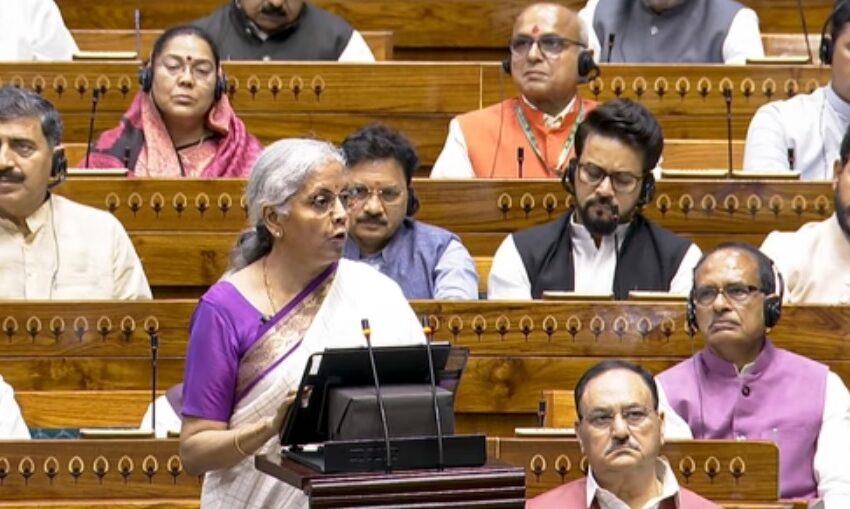
“Union Budget 2024: Top 5 Takeaways for Salaried Persons and Job Seekers”
Budget 2024: Nirmala Sitharaman presented the Union Budget 2024-25 during the Budget Session of Parliament on Tuesday.
Budget 2024: Finance minister Nirmala Sitharaman on Tuesday presented the Union Budget 2024-25 during the Monsoon Session of Parliament. Nirmala Sitharaman became the first finance minister to present seven consecutive budget speeches, surpassing former prime minister Morarji Desai’s record of six consecutive budgets as finance minister between 1959 and 1964.
In her seventh record Budget, Nirmala Sitharaman outlined key priorities aimed at fostering economic growth and creating ample opportunities. These included productivity and resilience in agriculture, employment and skilling and services.
“India’s economic growth continues to be the shining exception (in a world that is gripped by policy uncertainties) and will remain so in the years ahead,” Sitharaman said while presenting the Budget in the Parliament. “In this budget, we particularly focus on employment, skilling, MSMEs, and the middle class.”
Here, we take a look at the measures aimed at salaried persons and job seekers in the Union Budget 2024-25.
Hike in standard deduction
In the budget, finance minister Nirmala Sitharaman announced an increase in the standard deduction for salaried employees from ₹50,000 to ₹75,000 under the new income tax regime – an increase of 50%.
Standard deduction refers to a flat deduction from the total salary earned by an employee in a year before calculating the applicable income tax rate.
Notably, no change has been announced regarding the standard deduction in the old tax regime .
New income tax slabs
In her budget speech, Nirmala Sitharaman also announced relaxation in the income tax slabs under the new tax regiment for the current fiscal year.
The new income tax slabs announced are as follows:
Up to ₹3 lakh: 0%
₹3 to ₹7 lakh: 5%
₹7 lakh to ₹10 lakh: 10%
₹10 lakh to ₹12 lakh: 15%
₹12 lakh to ₹15 lakh: 20%
Above ₹15 lakh: 30%
“As a result of these changes, a salaried employee in the new tax regime stands to save up to ₹17,500/- in income tax,” she announced.

Increase in tax deduction on family pension
Sitharaman also announced a plan to increase the family pension deduction amount for the better financial stability of salaried individuals and pensioners.
The deduction amount is proposed to be increased to ₹25,000 from ₹15,000, under the new tax regime.
“Deduction on family pension for pensioners is proposed to be enhanced from ₹15,000 to ₹25,000,” the finance minister said, adding that the move will provide relief to about 4 crore salaried individuals and pensioners.
One month wage to all new entrants in formal sector
Nirmala Sitharaman also announced that the government will provide a one-month wage to all persons newly entering the workplace in all formal sectors. This, the finance minister said, the government will directly transfer the amount to the employees as their provident fund contribution.
“…One month’s wage to all persons newly entering the workplace in all formal sectors. Direct Benefit Transfer of one month’s salary in 3 instalments to first-time employees as registered in the EPFO will be up to ₹15,000. The eligibility limit will be a salary of ₹1 lakh per month. The scheme will benefit 210 lakh youth,” the finance minister said while presenting the Budget.
The announcements were part of the prime minister’s package for employment and skilling.
In addition to the direct benefit transfer, the government also announced that incentives will be provided directly to both employees and employers based on their EPFO contribution in the first four years of employment. It also announced that employers will be reimbursed up to ₹3,000 per month for two years towards their EPFO contribution for each additional employee.
Internship in top 500 companies
The finance minister also said in her budget speech on Tuesday that the government would launch an internship scheme for youth in 500 top companies.
The scheme will cover 10 million young people over five years, Sitharaman added.
Those interning will also receive an internship allowance of ₹5,000 per month and a one-time assistance of ₹6,000.
“As the 5th scheme under the Prime Minister’s package, our government will launch a comprehensive scheme for providing internship opportunities in 500 top companies to 1 crore youth in 5 years. They will gain exposure for 12 months to real-life business environment, varied professions and employment opportunities,” she said in the Parliament.
“…Companies will be expected to bear the training cost and 10% of the internship cost from their CSR funds,” she added.



